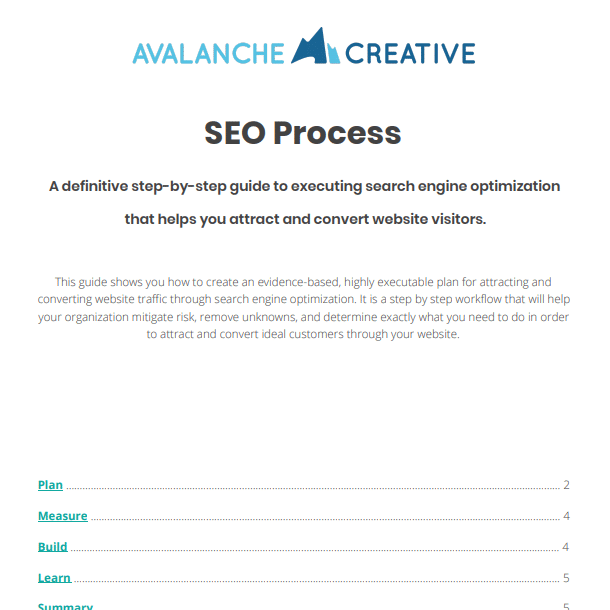How to Build a Healthcare SEO Strategy in 10 Steps
Category: Guide, Healthcare, Search Strategy | Tags:
It can be challenging for hospitals and health systems to implement a strong healthcare SEO strategy. However, it can be done, especially when you follow these 10 best practices we use at Avalanche Creative.
Why Choose SEO for Healthcare Services?
Google has become such an important part of your patients’ everyday lives that they’re more likely to search for information about healthcare conditions and services. Compared to having to wait for their doctor to give them answers to questions about their health, they often prefer to get their information immediately.
This is why it’s important to make sure you’re the one giving information. That way, you can vet its accuracy and use it to build trust with them before they even reach out to schedule an appointment. This makes them more likely to turn to your healthcare services when they need them the most.
How to Build a Healthcare SEO Strategy
Building an effective SEO strategy for your healthcare practices is an intensive process. It’s also often too challenging for healthcare marketers to do on their own without extra help. However, it is possible, especially if you have an experienced SEO agency supporting your efforts.
At a glance, here are the 10 steps you’ll need to take to build an effective healthcare SEO strategy.
1. Perform In-Depth Research
Marketing and SEO research should be the backbone of your healthcare organization’s SEO strategy. Start by auditing what you already have—your website could have materials that may be valuable for your upcoming strategy. It could also potentially have content you thought you needed, with a minimal amount of necessary updates before it’s ready to go live.
Some of the ways your patients are looking for answers about their medical questions may be different from how your team refers to them internally. Speaking to your physicians and satisfied past patients can tell you about the questions they had—and how they might word them. It also provides additional insights into the target audiences you serve; there’s often more than one.
2. Check Your Site Health
This is where you and your SEO agency will need to get “under the hood” of your website to see how well it works. By analyzing the backend of your website, you can more easily tell whether search engines can properly index all your website pages. This is also an opportunity to:
- Look for broken links
- Make sure your website can load quickly
- Ensure pages are set up to function properly on mobile devices
3. Identify Healthcare SEO Keywords
Here’s where the fun begins. You or your agency partner need to research and find the best possible healthcare SEO keywords to target for your content strategy.
Using tools like Google Search Console or SEMrush as your guide, search for keywords relating to your service lines. These tools allow you to see how many people are searching for them, how difficult it may be to rank for them, and the intent behind how people are searching for them.
4. Write Engaging Content
The content you write should culminate your competitive, on-site, and keyword research. Whether you’re developing content in-house or working with a dedicated healthcare content marketing agency, your healthcare brand’s content should address the needs of your patients and answer their questions.
One extra step healthcare organizations need to take to help their content be seen is having their physicians review your content.
This is in line with Google’s best practices for creating helpful, people-first content. The search engine refers to medicine and healthcare as one of its “Your Money or Your Life” topics, meaning they need to be vetted and certified by practicing physicians. Even though your website content should never be an alternative to medical advice, this lets people know the information you’re providing is medically accurate.
5. Follow Best Practices for Publishing
It’s important to make sure your healthcare content is easy to read and navigate. Here are a few of the best practices to follow when you’re publishing to make that happen:
- Keep the design simple: This makes it easy for your reader to find what they’re looking for.
- Don’t overuse headers: Technically, headers on your website range from the hefty H1 to the more diminutive H6 or smaller. Stick to using H2 and H3 headers in the body of your content to make it easier for people and search engine crawlers to read.
- Include alt text: This helps people who need screen readers to understand what your images are about, and tells Google what’s in them as well.
- Include clear calls to action: Keep the message of your content clear and don’t beat around the bush. If someone’s looking at your content, they’re looking for medical answers instead of reading comprehension tests.
These are just a baseline. When you’re working with an expert SEO agency, they’ll have dozens of other tricks they use during publication to make your page more visible and easier to navigate.
6. Create a Backlinking Strategy
Done right, backlinks are extremely valuable tools for building your domain’s authority in ways that help your patients find you. This might include:
- Developing a long-term strategy for guest blog posts on other websites,
- Ensuring your healthcare system is linked to local Chambers of Commerce and other directories
- Working with insurance provider websites to make sure your website links to theirs as a trusted healthcare provider.
7. Optimize for Local SEO
We can’t overstate how important local SEO is for healthcare organizations. When your patients are looking for healthcare services or trying to find a specialist in their area, you should be one of the first results they find on Google.
One of the most effective ways to optimize local healthcare SEO is to create location pages for your service lines and locations where you have a clinic, doctor’s office, or hospital. Doing so and listing details about the services you provide at that location allows you to more easily reach people who are searching for phrases like “sleep clinic in Grand Rapids” or “urgent care in Holland.”
8. Set Up a Google My Business Profile
This is another way you can stay engaged with potential patients while building authority for your website. Google My Business allows you to more easily promote your healthcare system’s brand authority and showcase how satisfied customers have felt about your services.
This is essential for your healthcare local SEO strategy as well. Every hospital and clinic in your organization should have its own Google My Business profile. That way, when people are searching for your service lines—whether it’s urgent care, family medicine, pain management, or anything in between—they can see the location of clinics or hospitals near them more easily.
9. Monitor and Adjust
Your healthcare marketing and SEO strategy is just as likely to grow and change as your patient populations are. That’s why it’s essential to continue tracking the results of your content marketing efforts regularly.
Much like other strategies your healthcare marketing department uses, your SEO and content strategy might look very different now than it did a few years ago. Being able to track your results over the months, quarters, and years allows you to more easily adjust your strategy so it constantly reflects what your patients need.
10. Implement Technical SEO Best Practices
Like other parts of your marketing strategy, SEO isn’t something that you can simply set once with a few new blog pages and never touch them again. Technical SEO in particular requires regular maintenance. Here are some of the best practices we typically use for our own clients in the healthcare space:
- Using hypertext transfer protocol secure (HTTPS) as a security measure for your website
- Finding and removing or redirecting duplicate pieces of content
- Making sure your pages have a fast loading time
- Ensuring that your website is optimized for mobile devices
- Updating your sitemap
- Implementing structured data
- Ensuring every page has a meta description
- Setting your pages up to be accessible to those with limited vision and mobility
Talk to the Healthcare SEO Experts
Ready to make your healthcare marketing strategy go the extra mile for your organization? Connect with our healthcare SEO experts to see what a quality SEO and content strategy can do for you.
Share this article:
The Avalanche Email: Fun. Simple. Educational. No Selling.
Learn Result-focused SEO & Content
Join over 2,272+ others who get one email every Wednesday with simple instructions on how to get more website traffic and leads through SEO and content marketing. (Learn more about the email)
Keep Learning
Creating the Perfect SEO Content Template in Google Docs
Learn how to create an SEO Content Templates in Google Docs to help drive new traffic to your website from the search engines. SEO Content Templates provide specific recommendations and directives for creating new content on your website with the purpose of improving your SEO.
How To Show Up in Gemini (And Win More Local Jobs)
Show up in Gemini when homeowners search for landscaping services. Build the right signals on Google and your website to win more qualified local jobs.
How to Run Google Ads for Landscapers: A Complete Guide
Learn how to set up Google Ads for landscapers, attract qualified leads, and win more local jobs with this step-by-step guide.
🏔️ Watering > Planting New Seeds
Your next marketing win may already be on your site. Learn how to optimize existing pages for better rankings, traffic, and results.
The Recipe vs. The Meal
Your customers buy the experience, not the product. Discover a simple way to shift your message from ingredients to the full meal.
What’s the Best CMS for Landscaping Businesses?
Compare the best website platforms for landscapers. Learn the pros and cons of Wix, Squarespace, and WordPress, and why WordPress is best for long-term SEO.






